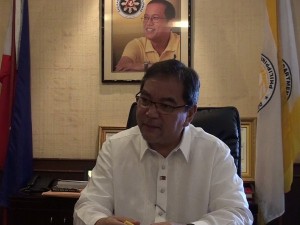OFWs urged: Come home more often, join FB, invite all
Add a few more Facebook friends and earn the title “new tourism ambassadors” in the process.
The catchy campaign come-on was pitched by Tourism Secretary Ramon Jimenez Jr., who urged more than 9 million overseas Filipinos to “go into the social network and begin to connect with everyone else in the world.”
“No matter how many kinds of Filipinos are in the world today—Filipino-Americans, Filipino-Chinese, Filipino-Italians, Filipino-Japanese, Filipino-Singaporeans, Filipino-French, Filipino-Arabs, Filipino-Germans, Filipino-Canadians and Filipino-Swedes, among others—there will always be only one type of fun. It’s called Filipino fun,” Jimenez said in a speech during the closing program of the Second Global Summit of Filipinos in the Diaspora on Feb. 27 in a Makati City hotel.
He said that kind of fun comes from an openness, which happens to be a common Filipino trait.
“To build a nation, one can only begin with the most basic of all ingredients—national pride. Your self-esteem, your confidence is what will make people sit up and take notice. They will praise you for your hard work, your perseverance, your intelligence, your discipline,” he said.
“But if you are great fun, if you are confident in yourself, they will follow you in the Philippines,” he added.
Come home
In his remarks, Jimenez also urged overseas Filipinos to come home to the Philippines more often.
Last year, a record 4.27 million tourists visited the country, a 9.07-percent increase over the 3.92 million visitors in 2011.
Jimenez expressed confidence that the 2012 figures could be surpassed this year with the help of the Filipino diaspora, which he said was “not just a spreading out of Filipinos.”
“Because if all we did was to spread out, it could be the beginning of a separation, which is what makes this gathering very crucial, some important and so necessary,” he said.
Common view
Jimenez said the tourism slogan “It’s more fun in the Philippines” is an invitation to the world that Filipinos share more than a language.
“We share a common view of our world. We remind each other of the things that matter most—family, friendship and God,” he added.
For his part, Foreign Secretary Albert del Rosario said the government was encouraging the active participation of overseas Filipinos and their involvement in national issues.
“Our foreign service posts are partners of the Commission on Filipinos Overseas in communicating with and mobilizing overseas Filipinos to participate in various programs,” including, among others, the Business Advisory Circle, which assists Philippine nationals abroad in setting up business partnerships in the country; the Alay Dunong program, which systematizes the skills and technology exchange between overseas Filipinos and the Philippines; and the Return and Reintegration Program, which assists balikbayans to successfully reintegrate into local life.
Proactive approach
Del Rosario said the country’s embassies and consulates abroad were also taking a proactive approach to urge overseas Filipinos to join the country’s overseas absentee voting and dual citizenship programs.
The government also puts the welfare and protection of the rights of Filipinos abroad in its top priorities, he added.
“In cooperation with other government agencies and international organizations, the DFA (Department of Foreign Affairs) has repatriated a total of 14,203 OFWs (overseas Filipino workers) from areas affected by civil strife or natural disasters, from 2011 up to the present. In particular, a total of 3,457 Filipinos were repatriated from war-torn Syria since the uprising began in 2011. Despite the ongoing crisis in the middle eastern country, the Philippine Embassy in Damascus continues its operations in order to evacuate the OFWs who remain there and ensure their safety and well-being,” he reported.
Del Rosario said during the past eight years, 746 Filipino seafarers who fell victims to piracy had been released and repatriated through the joint efforts of the country’s embassies abroad, manning agencies and the sailors’ principals.
Last year, 122 Filipino victims of human trafficking and illegal recruitment were assisted by the DFA, he said.
In 2011, a total of 28 OFWs facing the death penalty were provided legal assistance by the agency. Last year, at least 40 of 130 OFWs with death penalty cases were commuted to life or fixed imprisonment, he said.
To further intensify efforts to promote and protect the rights of Filipino migrant workers, the DFA head said the Philippines had adopted a new qualification framework containing sets of training regulations for Filipinos that prescribe competency standards for various qualifications.
“The country also ratified in August 2012 the International Labor Convention (ILO) No. 189 on decent work for household service workers,” said Del Rosario, noting the Philippines was the “first Asian nation to commit itself to the respect and implementation of the new ILO labor standard that was adopted on June 16, 2011, during the ILO conference in Geneva.”

